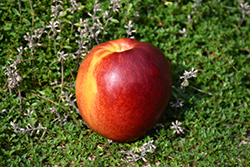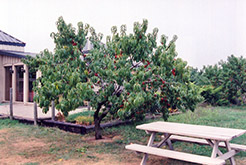


| Phone: |
| 613-599-3419 |
| Email: |
| info@makeitgreen.ca | Location: |
| 5200 Flewellyn Rd. Stittsville, Ontario
Need Directions? Click for map |
Welcome to our plant search tool. This database contains many of the thousands of plants that we carry. There are some notable exceptions. Hundreds of new perennials come out every year and Make It Green has been a leader in making them available to you. Eventually the recent introductions will make it to our plant search tool but every year there will be a lag between our in-store plant selection and this search tool. Unfortunately this search tool can't cover everything that we will carry this year. We also carry over 100 varieties of rare and unusual evergreens and over 100 varieties of hard-to-find shrubs many of which are not in the plant search. Click on the Plant List button for a list of nearly all the woody plants (trees, shrubs and evergreens) that we have ordered or already have in stock for this coming year.
Hardired Nectarine*
Prunus persica var. nucipersica 'Hardired'
* This is a "special order" plant - contact store for details
Height: 20 feet
Spread: 25 feet
Sunlight:
![]()
Hardiness Zone: 6a
Description:
A fine and popular fruit tree, bearing sweet, juicy reddish-yellow nectarines in mid summer; freestone; very showy pink flowers in spring; low, spreading habit; susceptible to late spring freezes and disease, needs full sun and well-drained soil
Edible Qualities
Hardired Nectarine is a small tree that is typically grown for its edible qualities. It produces scarlet round fruit (technically 'drupes') with hints of yellow and yellow flesh which are usually ready for picking in mid summer. Note that the fruits have hard inedible pits inside which must be removed before eating or processing. The fruits have a sweet taste and a juicy texture.
The fruit are most often used in the following ways:
- Fresh Eating
- Cooking
- Baking
- Preserves
- Canning
Features & Attributes
Hardired Nectarine is blanketed in stunning clusters of fragrant pink flowers along the branches in early spring, which emerge from distinctive rose flower buds before the leaves. It has dark green deciduous foliage. The narrow leaves turn yellow in fall. The fruits are showy scarlet drupes with hints of yellow, which are carried in abundance in mid summer. The fruit can be messy if allowed to drop on the lawn or walkways, and may require occasional clean-up.
This is a deciduous tree with a more or less rounded form. Its average texture blends into the landscape, but can be balanced by one or two finer or coarser trees or shrubs for an effective composition. This plant will require occasional maintenance and upkeep, and is best pruned in late winter once the threat of extreme cold has passed. Gardeners should be aware of the following characteristic(s) that may warrant special consideration;
- Messy
- Insects
- Disease
Aside from its primary use as an edible, Hardired Nectarine is sutiable for the following landscape applications;
- Accent
- Shade
- Orchard/Edible Landscaping
Planting & Growing
Hardired Nectarine will grow to be about 20 feet tall at maturity, with a spread of 25 feet. It has a low canopy with a typical clearance of 3 feet from the ground, and is suitable for planting under power lines. It grows at a medium rate, and under ideal conditions can be expected to live for 40 years or more. While it is considered to be somewhat self-pollinating, it tends to set heavier quantities of fruit with a different variety of the same species growing nearby.
This tree is typically grown in a designated area of the yard because of its mature size and spread. It should only be grown in full sunlight. It does best in average to evenly moist conditions, but will not tolerate standing water. It is not particular as to soil type or pH. It is highly tolerant of urban pollution and will even thrive in inner city environments, and will benefit from being planted in a relatively sheltered location. This is a selected variety of a species not originally from North America.
This plant is not reliably hardy in our region, and certain restrictions may apply; contact the store for more information.
* This is a "special order" plant - contact store for details



